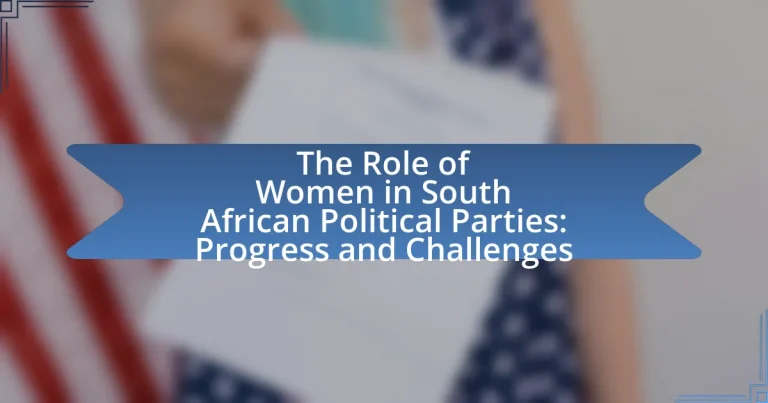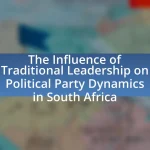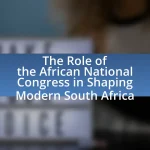The article examines the role of women in South African political parties, highlighting their significant influence on policy-making and representation since the end of apartheid. It details the evolution of women’s participation, noting the implementation of gender quotas by parties like the African National Congress (ANC), which has led to women holding approximately 46% of seats in the National Assembly as of 2023. The article also addresses historical factors affecting women’s political involvement, current statistics on representation, challenges faced within party structures, and the impact of women’s organizations on policy-making. Additionally, it discusses future prospects for women’s political participation and strategies to enhance their roles in governance.
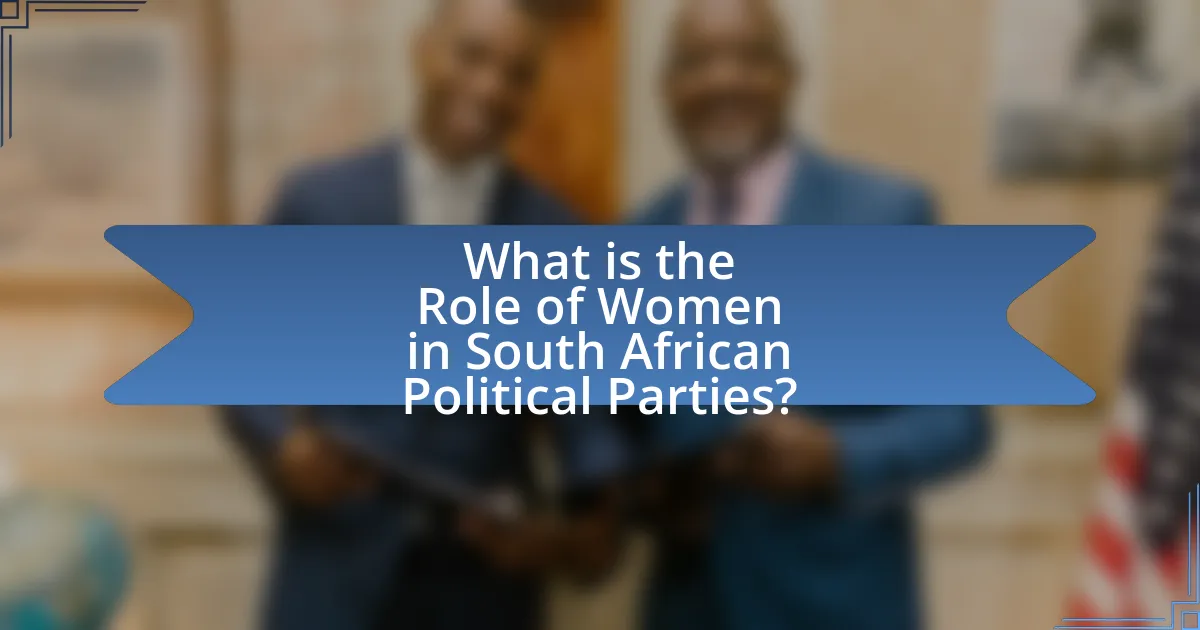
What is the Role of Women in South African Political Parties?
Women play a crucial role in South African political parties, significantly influencing policy-making and representation. Their involvement has increased since the end of apartheid, with parties like the African National Congress (ANC) implementing gender quotas to ensure women’s representation in leadership positions. For instance, the ANC’s 50% gender representation target in its structures has led to a notable rise in female politicians, with women holding approximately 46% of seats in the National Assembly as of 2021. This shift reflects a broader commitment to gender equality in governance, although challenges such as patriarchal norms and limited access to resources persist, impacting women’s full participation in politics.
How has the role of women evolved in South African political parties over time?
The role of women in South African political parties has significantly evolved from marginalization to increased representation and leadership. Historically, women were largely excluded from political processes, with the apartheid era seeing minimal participation in decision-making roles. However, post-1994, the introduction of gender quotas and policies aimed at promoting equality led to a notable increase in women’s representation in political parties, exemplified by the African National Congress (ANC) implementing a 50% gender quota for its candidates. By 2021, women held approximately 46% of seats in the National Assembly, reflecting a substantial shift towards gender parity in politics. This evolution is further supported by the establishment of women’s leagues within parties, which advocate for women’s rights and influence policy-making.
What historical factors have influenced women’s participation in politics in South Africa?
Women’s participation in politics in South Africa has been significantly influenced by historical factors such as colonialism, apartheid, and the women’s liberation movement. Colonial policies marginalized women politically and socially, limiting their rights and access to political structures. During apartheid, the systemic oppression of black South Africans included the disenfranchisement of women, but this period also saw the rise of women’s organizations, such as the African National Congress Women’s League, which mobilized women against oppressive laws. The 1994 democratic transition marked a pivotal moment, as the new constitution enshrined gender equality, leading to increased representation of women in political offices. Statistics from the Inter-Parliamentary Union indicate that South Africa ranks among the top countries for women’s representation in parliament, reflecting the impact of these historical movements and legal frameworks on women’s political participation.
How have women’s roles in political parties changed since the end of apartheid?
Since the end of apartheid, women’s roles in South African political parties have significantly expanded, leading to increased representation and participation in leadership positions. The introduction of gender quotas by various political parties, such as the African National Congress, mandated that at least 30% of candidates for elections be women, resulting in a rise in female parliamentarians from 2.7% in 1994 to over 46% by 2021. This shift has enabled women to influence policy-making and advocate for issues such as gender equality and social justice more effectively. Additionally, women’s organizations within political parties have emerged, further empowering women to engage in political processes and leadership roles.
What are the current statistics regarding women’s representation in South African political parties?
As of 2023, women’s representation in South African political parties stands at approximately 46% in the National Assembly and around 30% in provincial legislatures. The African National Congress (ANC) leads with a gender parity policy, achieving about 50% female representation on its candidate lists. The Democratic Alliance (DA) follows with around 40% female representation. These statistics reflect ongoing efforts to enhance gender equality in political participation, supported by legislative frameworks such as the Electoral Act and the Gender Policy Framework.
How does women’s representation in South Africa compare to other countries?
Women’s representation in South Africa is relatively high compared to many other countries, ranking 10th globally in terms of women in national parliament, with women holding approximately 46% of seats in the National Assembly as of 2023. This figure surpasses the global average of around 26% and is significantly higher than in countries like the United States, where women hold about 27% of congressional seats, and Japan, with only about 10%. South Africa’s commitment to gender parity in political representation is enshrined in its constitution and supported by various policies aimed at promoting women’s participation in governance.
What political parties in South Africa have the highest and lowest representation of women?
The political party in South Africa with the highest representation of women is the African National Congress (ANC), which has consistently maintained a significant percentage of female representation, often exceeding 40% in its parliamentary ranks. Conversely, the political party with the lowest representation of women is the Economic Freedom Fighters (EFF), which has reported female representation around 25% in its parliamentary delegation. These statistics highlight the disparities in gender representation among South African political parties, reflecting ongoing challenges in achieving gender parity in political leadership.
What challenges do women face within South African political parties?
Women in South African political parties face significant challenges, including gender-based discrimination, underrepresentation in leadership positions, and a lack of support for women’s issues. Gender-based discrimination manifests in various forms, such as biased attitudes and stereotypes that undermine women’s capabilities and contributions. Despite policies promoting gender equality, women remain underrepresented in decision-making roles; for instance, as of 2021, women held only 46% of parliamentary seats, indicating a gap in political representation. Additionally, political parties often prioritize male-dominated agendas, leading to insufficient advocacy for issues that specifically affect women, such as gender-based violence and reproductive rights. These challenges hinder women’s full participation and influence within the political landscape of South Africa.
How do cultural attitudes impact women’s political participation in South Africa?
Cultural attitudes significantly impact women’s political participation in South Africa by reinforcing traditional gender roles that often limit women’s involvement in politics. In many communities, prevailing norms prioritize male leadership and discourage women from seeking political office or engaging in political discourse. For instance, a study by the Human Sciences Research Council in 2019 found that 60% of women reported facing societal pressure to conform to domestic roles rather than pursue careers in politics. Additionally, cultural beliefs about women’s capabilities can lead to lower levels of support for female candidates, further hindering their political aspirations. These cultural barriers contribute to the underrepresentation of women in political positions, despite legal frameworks promoting gender equality.
What barriers exist within political party structures that hinder women’s advancement?
Barriers within political party structures that hinder women’s advancement include patriarchal norms, lack of support networks, and limited access to leadership positions. Patriarchal norms often dominate party cultures, leading to the marginalization of women’s voices and contributions. Additionally, the absence of robust support networks for women candidates can impede their ability to navigate the political landscape effectively. Research indicates that women are underrepresented in leadership roles, with only 27% of parliamentary seats held by women in South Africa as of 2021, highlighting the systemic challenges they face in achieving equal representation.
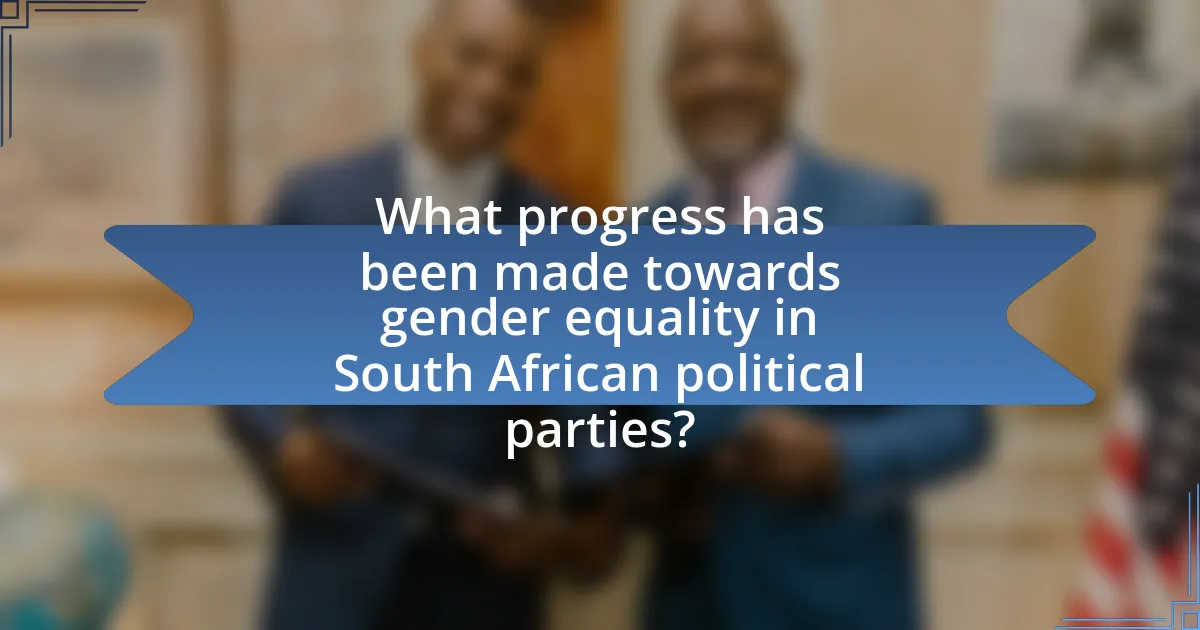
What progress has been made towards gender equality in South African political parties?
Significant progress has been made towards gender equality in South African political parties, particularly through legislative measures and party policies. The South African Constitution mandates equality, and the Electoral Act requires political parties to promote gender representation, leading to increased female representation in leadership roles. For instance, the African National Congress (ANC) has implemented a 50% quota for women in its structures, resulting in women holding approximately 46% of parliamentary seats as of 2023. Additionally, the establishment of the Women’s League within major parties has further advocated for women’s rights and participation in politics, contributing to a more inclusive political landscape.
How have political parties implemented policies to promote women’s participation?
Political parties in South Africa have implemented various policies to promote women’s participation by establishing gender quotas and creating supportive frameworks. For instance, the African National Congress (ANC) adopted a 50% gender quota for its candidates in elections, which has significantly increased women’s representation in leadership positions. Additionally, the Electoral Act mandates that political parties must ensure that at least 50% of their candidates are women, reinforcing the commitment to gender parity. These policies have led to a notable rise in women’s participation in politics, with women holding approximately 46% of seats in the National Assembly as of 2023, demonstrating the effectiveness of these initiatives in enhancing female political engagement.
What specific initiatives have been successful in increasing women’s representation?
Specific initiatives that have successfully increased women’s representation in South African political parties include the implementation of gender quotas and the establishment of women’s leagues within parties. Gender quotas, mandated by the Electoral Act of 1998, require political parties to ensure that at least 50% of their candidates for elections are women. This legislative framework has led to a significant increase in women’s representation in the National Assembly, which rose from 27% in 1994 to over 46% in 2021. Additionally, women’s leagues, such as the African National Congress Women’s League, have played a crucial role in advocating for women’s issues and supporting female candidates, further enhancing their visibility and participation in politics.
How do quotas and affirmative action policies affect women’s roles in politics?
Quotas and affirmative action policies significantly enhance women’s roles in politics by ensuring their representation in decision-making processes. In South Africa, the implementation of gender quotas has led to an increase in female representation in legislative bodies, with women holding 46% of seats in the National Assembly as of 2021, compared to only 27% in 1994. These policies create a more inclusive political environment, enabling women to influence policy-making and advocate for issues pertinent to their communities. Research by the Inter-Parliamentary Union indicates that countries with gender quotas tend to have higher levels of women’s political participation, demonstrating the effectiveness of such measures in promoting gender equality in political spheres.
What role do women’s organizations play in South African politics?
Women’s organizations play a crucial role in South African politics by advocating for gender equality and influencing policy decisions. These organizations, such as the African National Congress Women’s League and the Women’s League of the Democratic Alliance, mobilize women to participate in political processes, promote women’s rights, and challenge gender-based violence. Their efforts have led to significant legislative changes, including the Promotion of Equality and Prevention of Unfair Discrimination Act of 2000, which aims to eliminate discrimination against women. Additionally, women’s organizations contribute to increasing female representation in political offices, with South Africa achieving one of the highest percentages of women in parliament globally, at around 46% as of 2021.
How do these organizations support women within political parties?
Organizations support women within political parties by providing training, mentorship, and resources aimed at enhancing their political skills and leadership capabilities. For instance, initiatives like the African Women’s Leadership Network focus on empowering women through capacity-building programs that equip them with the necessary tools to navigate political landscapes effectively. Additionally, organizations often advocate for gender quotas and policies that promote women’s representation, which has been shown to increase female participation in decision-making roles within political parties. According to the Inter-Parliamentary Union, countries with gender quotas have seen a significant rise in women’s parliamentary representation, demonstrating the effectiveness of such organizational support.
What impact do women’s organizations have on policy-making in South Africa?
Women’s organizations significantly influence policy-making in South Africa by advocating for gender equality and women’s rights. These organizations engage in lobbying efforts, provide research and data to inform policy decisions, and mobilize public support for legislative changes. For instance, the Commission for Gender Equality, established under the South African Constitution, works alongside women’s organizations to promote policies that address gender-based violence and economic empowerment. Their efforts have led to the implementation of laws such as the Domestic Violence Act and the Promotion of Equality and Prevention of Unfair Discrimination Act, which reflect the impact of women’s advocacy on national policy frameworks.
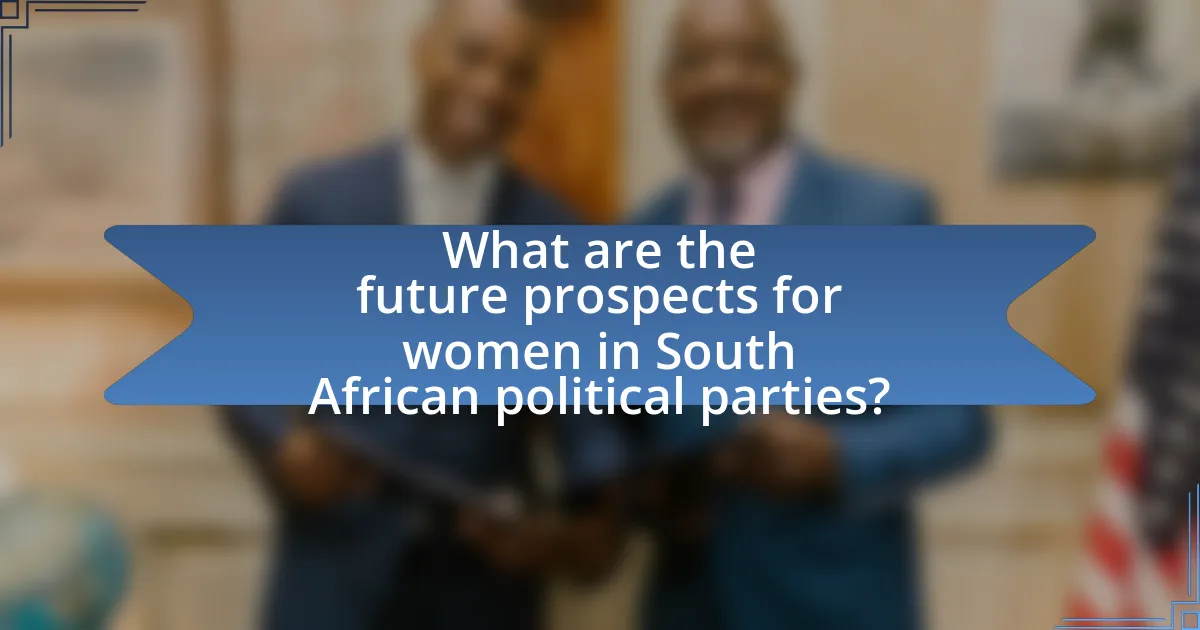
What are the future prospects for women in South African political parties?
The future prospects for women in South African political parties are increasingly positive, driven by legislative frameworks and societal shifts advocating for gender equality. The South African Constitution mandates equal representation, and the Electoral Act encourages political parties to adopt gender quotas, resulting in a gradual increase in women’s representation in leadership roles. For instance, as of 2021, women held 46% of seats in the National Assembly, reflecting a commitment to gender parity. Additionally, initiatives by organizations such as the African National Congress and the Democratic Alliance focus on empowering women within their ranks, further enhancing their political influence. These developments indicate a trend towards greater inclusion and leadership opportunities for women in South African politics.
What strategies can be employed to enhance women’s political participation moving forward?
To enhance women’s political participation moving forward, implementing targeted mentorship programs and establishing gender quotas in political parties are essential strategies. Mentorship programs can provide women with the necessary skills, confidence, and networks to engage in politics effectively, as evidenced by initiatives like the African Women’s Leadership Network, which has successfully increased women’s representation in various political spheres. Gender quotas, as seen in countries like Rwanda, which has the highest percentage of women in parliament globally at 61%, can ensure that women have a guaranteed presence in decision-making roles. These strategies, supported by empirical evidence, can significantly improve women’s political engagement and representation in South Africa.
How can education and mentorship programs empower future female leaders?
Education and mentorship programs empower future female leaders by providing essential skills, knowledge, and networking opportunities that enhance their leadership capabilities. These programs often focus on developing critical thinking, communication, and strategic planning skills, which are vital for effective leadership. For instance, research from the World Economic Forum indicates that mentorship can significantly increase women’s confidence and career advancement, with 75% of women in leadership roles crediting mentorship as a key factor in their success. Additionally, education initiatives that emphasize gender equality and leadership training can help dismantle societal barriers, fostering an environment where women can thrive in political spheres.
What role can men play in supporting women’s political advancement?
Men can play a crucial role in supporting women’s political advancement by actively advocating for gender equality and promoting women’s leadership within political parties. This support can manifest through mentorship programs, where men in leadership positions guide and empower women candidates, thereby increasing their visibility and opportunities in politics. Research indicates that political parties with male allies advocating for women’s representation tend to have higher rates of female candidates; for instance, the African National Congress has implemented quotas that have led to increased female representation, supported by male party members. Furthermore, men can challenge gender biases and stereotypes within their political circles, fostering an environment that values women’s contributions and perspectives. By taking these actions, men not only enhance women’s political participation but also contribute to a more equitable political landscape.
What best practices can be adopted to ensure sustained progress for women in politics?
To ensure sustained progress for women in politics, implementing gender quotas is essential. Gender quotas have been shown to increase women’s representation in political offices significantly; for instance, countries like Rwanda, which adopted a 30% quota, now have over 60% female representation in parliament. Additionally, providing mentorship programs for aspiring female politicians can enhance their skills and confidence, as evidenced by initiatives in South Africa that have successfully increased women’s participation in local governance. Furthermore, fostering a supportive political culture that addresses gender-based violence and discrimination is crucial, as research indicates that such environments lead to higher retention rates of women in politics.
How can political parties create inclusive environments for women?
Political parties can create inclusive environments for women by implementing policies that promote gender equality and actively encouraging women’s participation in leadership roles. For instance, the African National Congress (ANC) in South Africa has adopted a 50% gender representation policy, which mandates equal representation of women in all party structures. This approach has led to increased female representation in political positions, as evidenced by the fact that women held 46% of the seats in the National Assembly following the 2019 elections. Additionally, providing mentorship programs and training specifically for women can empower them to take on leadership roles, further enhancing their visibility and influence within the party.
What lessons can be learned from successful female politicians in South Africa?
Successful female politicians in South Africa demonstrate the importance of resilience, strategic networking, and advocacy for gender equality. These politicians, such as Nkosazana Dlamini-Zuma and Baleka Mbete, have shown that overcoming systemic barriers requires persistence and the ability to build alliances across political lines. Their achievements highlight the necessity of mentorship and support systems for aspiring female leaders, as evidenced by initiatives like the African Women’s Leadership Network, which fosters leadership skills among women. Furthermore, their focus on policy issues that address women’s rights and social justice underscores the critical role female politicians play in shaping inclusive governance.
